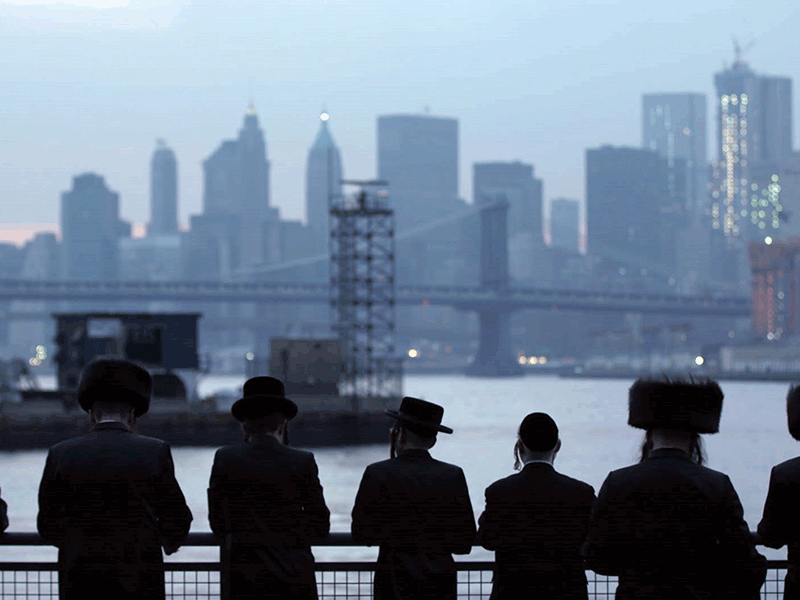Documentarians Rachel Grady and Heidi Ewing say that the trust between a filmmaker and subject is paramount.
That principle was integral during the three-year production of their latest film, One of Us, which screens on Netflix starting Oct. 20. The documentary focuses on three chassidic Jews from New York who chose to leave their community, and their struggles during this transition.
“We made it clear to [our subjects] that they can tell us to turn the camera off at any time,” Ewing told The CJN over the phone from New York. “Their access is a gift being given to us, and we don’t take it for granted.”
Although the three main figures in the film remain religiously devout, none of them felt entirely at home within the ultra-Orthodox community. They each encountered societal oppression and trauma after deciding to leave the fold.
Etty, a mother of seven, opens up about more than a decade of spousal abuse, and her difficulties to retain custody of her children after divorcing her husband.

Meanwhile, Ari decided to enter the secular world in his late teens. In an early scene from One of Us, he explains, “I didn’t feel like the person I looked like.”
However, Ari soon turned to substance abuse and had difficulty finding work. In the film, he also reveals the child abuse he suffered at a summer camp he attended.
The last subject is actor Luzer Twersky, who some will recognize from his roles in the award-winning Transparent and the Canadian drama Felix and Meira.
Twersky looks visibly more comfortable in the secular world, as it has been several years since he decided to pursue acting, but he is not entirely at peace with his past.
The film is being touted as a major Oscar contender for the streaming service in the documentary category.
READ: EX-MONTREALER VOICES CHARACTERS ON ONLINE SERIES
Grady and Ewing say they got access to their ultra-Orthodox subjects through the non-profit organization Footsteps, a support group for men and women trying to leave the community. Due to the privacy and sensitivity of many Footsteps members, only a few attendees of that group appear in the film.
“I’m pretty convinced that getting the kind of unfettered access into the [chassidic] community as an outsider is never happening,” says Grady, who is Jewish.
The barriers to ultra-Orthodox settings and subjects helped to inform the look of the documentary. Gates, bars, and windows are visual motifs that indicate the lack of access the crew had to many within the community, as well as the desire among chassidic Jews to remain in the shadows of modern society.
“There’s no reason to act like this is a community that wants to be filmed,” Ewing says. “We made sure not to give the impression that we were being welcomed.”
At first, Etty asked the filmmakers to conceal her face and identity. However, as the bond between the directors and the subject solidified, Etty changed her mind.
The scene where the viewer first sees her face, about halfway through the 94-minute film, is extremely powerful.
Both Ewing and Grady say they expect the film to be a conversation starter. At the world premiere in Toronto, Etty and Ari were both present, and the directors noted the large outpouring of emotional support from the audience.
“They were very brave,” Grady says of the subjects. “No one has really believed them from their own community. I think it’s somewhat liberating [for them] to speak to and be in the presence of other people who are outsiders.”
One of Us is not the directors’ first examination of religious orthodoxy. They both received Oscar nominations in 2007 for the documentary Jesus Camp, which examined an evangelical Christian summer camp.
The filmmakers insist their new film is not an indictment of religious beliefs or practices. At the same time, given the distressing subject matter, Ewing and Grady did not want to come across as vilifying the broader Jewish community.
To ensure the doc didn’t contain elements that could be misconstrued as anti-Semitic, Grady and Ewing showed the film to rabbis and academics in Jewish studies.
“I would hate to [have] anything to do with something that would advertently affect the Jewish community, Orthodox or not,” Grady says. “The bigger story [in One of Us] has nothing to do with religion. It really is about identity and the price of individualism.”
One of Us is also not the only film from 2017 to focus on ultra-Orthodox Jewish subjects, after the indie hit Menashe and high-profile TIFF premiere Disobedience starring Rachel Weisz and Rachel McAdams.
“I think there’s a fascination with people who have opted out of this Internet age,” Ewing says. “There’s very little mystery left in the world… [and] a desire to know those people and to understand those communities.”







